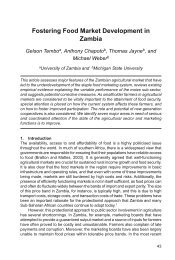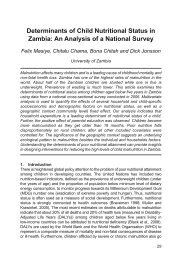Introduction to Basic Legal Citation - access-to-law home
Introduction to Basic Legal Citation - access-to-law home
Introduction to Basic Legal Citation - access-to-law home
Create successful ePaper yourself
Turn your PDF publications into a flip-book with our unique Google optimized e-Paper software.
cases filed after January 1, 1997 are <strong>to</strong> be cited in the same manner as North Dakota Court<br />
Supreme Court cases using the database identifier "ND App" (without periods).<br />
Ohio: Supreme Court citation practice | <strong>Citation</strong> rule(s)<br />
217<br />
Contents | Index | Help | < | ><br />
Examples from State ex rel. Kolcinko v. Ohio Police & Fire Pension Fund, 2012<br />
Ohio 46, 131 Ohio St. 3d 111, 961 N.E.2d 178<br />
. . . .<br />
{2} "Because the final OP & F board decision is not appealable, mandamus is available <strong>to</strong><br />
correct an abuse of discretion by the board in denying disability benefits." State ex rel.<br />
Tindira v. Ohio Police & Fire Pension Fund, 130 Ohio St.3d 62, 2011 Ohio 4677, 955 N.E.2d<br />
963, 28. A clear legal right <strong>to</strong> the requested relief in mandamus exists "where the board<br />
abuses its discretion by entering an order which is not supported by 'some evidence.'" Kinsey<br />
v. Bd. of Trustees of Police & Firemen's Disability & Pension Fund of Ohio, 49 Ohio St.3d<br />
224, 225, 551 N.E.2d 989 (1990).<br />
{3} In November 2009, the board of trustees upheld its previous decision denying<br />
Kolcinko's application for disability-retirement benefits. Kolcinko claimed entitlement <strong>to</strong> an<br />
award of benefits under R.C. 742.38(D)(1), which provides, "A member of the fund who is<br />
permanently and <strong>to</strong>tally disabled as the result of the performance of the member's official<br />
duties as a member of a police or fire department shall be paid annual disability benefits in<br />
accordance with division (A) of section 742.39 of the Revised Code." "'Totally disabled'<br />
means a member of the fund is unable <strong>to</strong> perform the duties of any gainful occupation for<br />
which the member is reasonably fitted by training, experience, and accomplishments," and<br />
"'[p]ermanently disabled' means a condition of disability from which there is no present<br />
indication of recovery." R.C. 742.38(D)(1)(a) and (b).<br />
. . . .<br />
{7} Under R.C. 742.38 and Ohio Adm.Code 742-3-05, the OP & F board is vested with the<br />
exclusive authority <strong>to</strong> evaluate the weight and credibility of the medical evidence in<br />
determining a member's entitlement <strong>to</strong> disability-retirement benefits. Notwithstanding Dr.<br />
Poa's and Dr. Resnick's conclusion that Kolcinko was permanently disabled, they further<br />
noted that Dr. Francis McCafferty had observed that Kolcinko complained of "certain patterns<br />
or combinations of features that are unusual or atypical in clinical populations but relatively<br />
common among individuals feigning mental disorder." Dr. Poa and Dr. Resnick opined that<br />
Kolcinko had a lower whole-person impairment (12 percent) than the 15 percent figure<br />
determined by Dr. Smarty.<br />
. . . .




